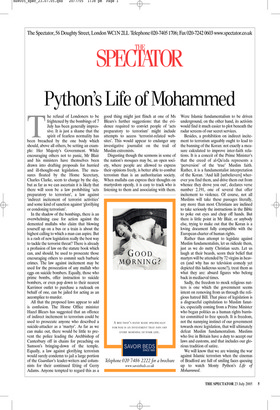Python’s Life of Mohammed
The refusal of Londoners to be frightened by the bombings of 7 July has been generally impressive. It is just a shame that the spirit of fearless normality has been breached by the one body which should, above all others, be setting an example: Her Majesty’s Government. While encouraging others not to panic, Mr Blair and his ministers have themselves been drawn into drafting proposals for hurried and ill-thought-out legislation. The measures floated by the Home Secretary, Charles Clarke, seem to change by the day, but as far as we can ascertain it is likely that there will soon be a law prohibiting ‘acts preparatory to terrorism’, a law against ‘indirect incitement of terrorist activities’ and some kind of sanction against ‘glorifying or condoning terrorism’.
In the shadow of the bombings, there is an overwhelming case for action against the demented mullahs who claim that blowing yourself up on a bus or a train is about the highest calling to which a man can aspire. But is a rash of new legislation really the best way to tackle the terrorist threat? There is already a profusion of law on the statute book which can, and should, be used to prosecute those encouraging others to commit such barbaric crimes. The law against incitement may be used for the prosecution of any mullah who eggs on suicide bombers. Equally, those who prime bombs, offer instruction to suicide bombers, or even pop down to their nearest Karrimor outlet to purchase a rucksack on behalf of one, can be jailed for acting as an accomplice to murder.
All that the proposed laws appear to add is confusion. The Home Office minister Hazel Blears has suggested that an offence of indirect incitement to terrorism could be used to prosecute anyone who described a suicide-attacker as a ‘martyr’. As far as we can make out, there would be little to prevent the police leading the Archbishop of Canterbury off in chains for preaching on Samson’s bringing-down of the temple. Equally, a law against glorifying terrorism would surely condemn to jail a large portion of the Guardian’s leader-writers and columnists for their continued fêting of Gerry Adams. Anyone tempted to regard this as a good thing might just flinch at one of Ms Blears’s further suggestions: that the evidence required to convict people of ‘acts preparatory to terrorism’ might include attempts to access ‘terrorist-related websites’. This would appear to endanger any investigative journalist on the trail of Muslim extremists.
Disgusting though the sermons in some of the nation’s mosques may be, an open society, where people are allowed to express their opinions freely, is better able to combat terrorism than is an authoritarian society. When mullahs can express their thoughts on martyrdom openly, it is easy to track who is listening to them and associating with them. Were Islamic fundamentalism to be driven underground, on the other hand, its activists would find it much easier to plot beneath the radar screens of our secret services.
Besides, a prohibition on indirect incitement to terrorism arguably ought to lead to the banning of the Koran: not exactly a measure calculated to improve inter-faith relations. It is a conceit of the Prime Minister’s that the creed of al-Qa’eda represents a ‘perversion’ of the ‘true’ Muslim faith. Rather, it is a fundamentalist interpretation of the Koran. ‘And kill [unbelievers] wherever you find them, and drive them out from whence they drove you out’, declares verse number 2.191, one of several that offer incitement to violence. Of course, not all Muslims will take these passages literally, any more than most Christians are inclined to take seriously the instructions in the Bible to poke out eyes and chop off hands. But there is little point in Mr Blair, or anybody else, trying to make out that the Koran is a loving document fully compatible with the European charter of human rights.
Rather than attempt to legislate against Muslim fundamentalists, let us ridicule them, just as we do nutty Christian sects. Let us laugh at their beards, scorn their belief that martyrs will be attended by 72 virgins in heaven (and why has no television comedy yet depicted this ludicrous scene?), treat them as what they are: absurd figures who belong back in mediaeval times.
Sadly, the freedom to mock religious nutters is one which the government seems intent on removing from us through the religious hatred Bill. That piece of legislation is a disgraceful capitulation to Muslim fanatics, especially coming from a Prime Minister who began politics as a human rights barrister committed to free speech. It is freedom, not the nannying instinct of our government towards more legislation, that will ultimately defeat Muslim fundamentalism. Muslims who live in Britain have a duty to accept our laws and customs, and that includes our glorious tradition of satire.
We will know that we are winning the war against Islamic terrorism when the cinemas of Bradford are full of smiling faces queuing up to watch Monty Python’s Life of Mohammed.















































 Previous page
Previous page